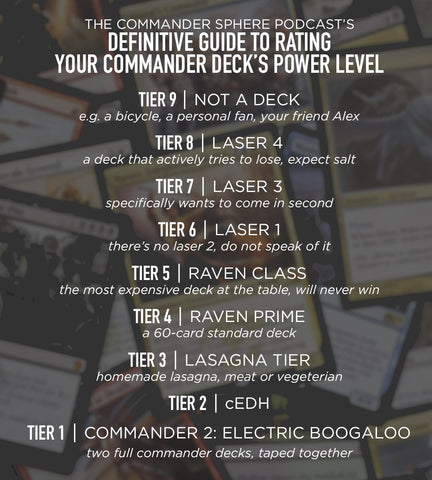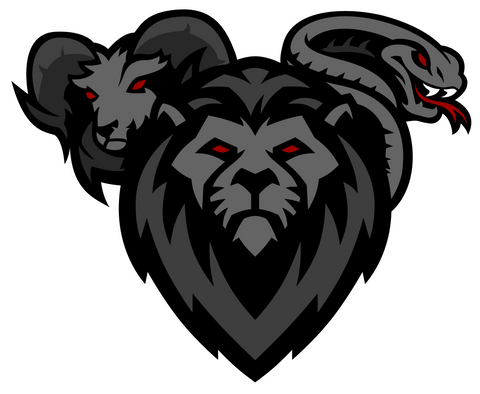Whether you’re new to Commander or a seasoned veteran, one thing that will improve your experience while playing is aligning on power level. This is a hotly debated topic in the community at large because there is no one-size-fits all approach that works, but if done right it can lead to more fun games and less feel-bad moments. With Commander being such an open and wide-appealing format, it can be quite common for player’s expectations to vary. In this article we’ll go over a small bit of history, cover some popular approaches and conclude with some steps you can take to align on power level in your next game.
Unlike other formats, Commander gameplay and rules aren’t regulated by Wizards of the Coast, but rather a Rules Committee made up of community members. The Commander Rules Committee (RC for short), determines the ban list, gathers community feedback (through an advisory group known as the CAG), and maintains the Philosophy of Commander document that defines what Commander is as a format. When Commander originally came into being as Elder Dragon Highlander, it was created as an alternative to competitive gameplay conceived by Adam Staley. Adam crossed paths with Sheldon Menery, a level 5 judge at the time, back in 2002. A few years later Menery wrote the seminal article on EDH for Star City Games, and would later introduce Scott Larabee to the format while at a Pro Tour. Shortly after that, the RC was born. For a more in-depth review of the history of Commander, check out this article by Charlie Hall on Polygon.
A key component of the Commander Philosophy document was the inclusion of Rule 0, an initial rule inviting players to modify the rules to maximize the enjoyment for everyone playing. As Sheldon Menery points out in this article from May of 2020, a few bad apples interpreted this incorrectly, and Rule 0 was formally removed. This change to the philosophy document followed a few key events in commander: the introduction of CommandFests (Commander focused MagicFests starting Nov 2019) and the move to online with CommandFest Online (June 2020). Power level has been a longstanding hot topic in Commander, but the introduction of organized play brought it to the forefront for Commander players.
Prominent content creators have provided their thoughts and opinions on power level throughout the years, but the earliest I’m aware of is an episode of The Command Zone, guest starring DJ from Jumbo Commander titled How to Power Up Your Decks (July 2018). Josh and DJ introduce a ten point scale covering five distinct groupings: Jank, Casual, Focused Optimized and Competitive. This scale is meant to be used as a framework for discussing the type of game the table looks for, and Josh aptly points out that as you move up the power scale, there’s a relationship with what turn the game ends on. Competitive (9-10) within this framework is where cEDH lives, with the idea being that at competitive tables everyone is playing full force to win as quickly as possible (emphasizing lots of interaction). From The Command Zone’s perspective, most people play in the 6-7 range, or somewhere between Focused and Optimized. Their definition of Focused is a deck that is “dialed in” on it’s game plan, with most cards in the deck working towards that goal and Optimized being the next step up where decks have more consistent wincons and more interaction. The Command Zone also did another episode on this topic (How to Determine Your Deck’s Power Level) just after the first in-person CommandFest in Seattle, where they emphasized the importance of aligning on power level.

With CommandFest being an organized event, prizing was allocated for winners of each pod and pods were completely randomized. There also was no notion of power level, which led to some unfun moments that participants needed to pay to experience. Not a good situation by any means. One redditor summarized their experience and highlighted the lack of power level as an area for improvement. I’m sure this person wasn’t the only one to provide this feedback, as a few months later (~Feb 2020) Gavin Verhey from Wizards announced that they had worked with Channel Fireball Events (CFB Events) to create a power level guide that would be trialed at MagicFest Reno. This guide mirrors the definitions laid out by The Command Zone, with Jank being replaced with “For the Fun of It”. As with The Command Zone, the intention from CFB Events was to provide a common understanding that strangers could use to align on a fun play experience for all. Around this same time frame, The Professor of Tolarian Community College fame published an episode of his “Untitled MTG Podcast” guest starring Olivia Gobert-Hicks (a CAG member and renowned cosplayer) to discuss How to Evaluate Your Commander Deck’s Power Level. Olivia and the Professor highlight the challenges with using subjective scales to align, and Olivia provides her approach, which is to ask “what turn does your deck do its thing”. As highlighted by The Command Zone, this can be a valid alternative to using scales.
Very shortly after the introduction of CFB’s formalized power level guide, the way we played Commander changed forever - we had to move fully online. While we lost the best way to play, playing vEDH or Cam-mander opened up some new experiences. SpellTable was developed, the PlayEDH Discord server became a way to organize games, and CommandFests moved completely online (keeping their power level guide consistent). This shift in play behaviour fueled the discourse on power level, and it continued to be a hot topic throughout 2020. CFB hosted three online CommandFests (June 2020, Aug 2020, and Nov 2020), which allowed players to queue for SpellTable games using a Discord bot that paired players based on player-determined power level. This approach led to mixed results for many, as the need for a discussion before play was minimized under the assumption that everyone was interpreting the posted power level guide consistently. In my experience playing in these three events, it worked well for the most part. The games I played were well balanced, and everyone got to do their thing and have fun doing it. Of course, since power level was determined prior without a discussion, there was no guarantee you wouldn’t get a pubstomper (someone who intentionally misrepresents their deck to dominate a table) in your randomly organized pod.

PlayEDH became a popular destination for Commander players while game stores were closed. It uses a distinct power level ranking system, which splits power level into the following groups: Battlecruiser, Low Power, Mid Power, High Power and Maximum Power. In order to interact in the community, you need to select a power level role, and have your decks power level validated by a Mentor. I prefer to play with others from Chimera (join the Discord here), but this can be an alternative if you’re really jonesing for some games and can’t find anyone to play with. Power level discourse didn’t end there however, with people slinging spells online via webcam other content creators provided their POV. One of my favourite conceptualizations of power level comes from The Commander Sphere podcast. In their “A Definitive System for Power Ranking” episode Dan and Rachel go over the best way to determine your deck’s power level varying from Not a Commander Deck to Lasagna Tier and capping with Commander 2: Electric Boogaloo. While satirical in content, once again the intent is the primary emphasis, with the goal being a way for people to talk about what kind of Commander game they want to play. The meme-worthy name of Lasagna Tier caught on with some cEDH players in late 2020 and was misinterpreted to encapsulate cEDH level of play with off-meta strategies. It was quickly re-named to Formula X1 Madhouse. If this sounds like your cup of tea, you should check out The FX1 Madhouse Discord channel. The Commander Sphere has since leaned into their definition of Lasagna Tier and defined it further in a follow up episode, but the quick summary is that it’s a philosophy that emphasizes a mutually enjoyable play experience for all above winning, hopefully leading to more fun for all and more memorable games.

Whether you’re playing Lasagna Tier or using a more classic approach of a numbered power scale, what you’re looking to get out of a game is an important differentiator. There’s no wrong way to play Commander, but knowing how you want to play, and finding others that share that sentiment will lead to more enjoyable games. So how do we go about this? The first step is to understand what it is you like about Commander. For me personally, I enjoy expressing my creativity through deck building, so winning is a very low priority for me. I’d much rather play a longer game where I get to show some neat interaction compared to a fast, highly interactive game (mostly due the fact that most of my decks run low interaction). I also don’t want a game to be one sided; I don’t want to win with ease nor do I want to watch someone else play Magic. I’m not a fan of infinite turns (or 25 minute turns for that matter), I don’t like counterspells as a form of removal (they are totally viable and you should play them) and I think mass land destruction should only be played (if at all) alongside a game ending combo. Does saying “let’s play at a 7” encapsulate all of my preferences? There’s no way, and that approach also assumes that everyone else playing would need to think of that definition as a 7. In established playgroups, this usually works itself out over the course of many play sessions, with slight tuning along the way, but what about for those one off games? Like many things, communication is critical.
After you know what you like and dislike in Commander, how should you go about communicating that? You could use Olivia Gobert-Hicks’ approach of “what turn do you want to play to?”. Or you could take some time and think of your “Commander elevator pitch” (started by Anton and boosted by Jim from The Spike Feeders). Mine would look something like: “Combo decks that may win through combat somewhere after turn 10, cool synergies with new-to-me cards are exciting and I’m not a fan of infinite turns or locking people out of the game. Everyone playing should be able to do their thing and someone should win I guess.” Of course, you need to be considerate of your preferences and allow others to be able to play alongside you (while I don’t like counterspells, I’m not going to make that a prerequisite for playing with me as I’d have no one to play with). Whichever way you do it, the guiding light should be as its defined in the Commander Philosophy document: Commander is about fun in a multiplayer setting, focusing on a resonant experience that’s held together with a bit of communication around how we want to achieve that.

I hope you found this one interesting and informative, and that you feel better equipped to align expectations before your next game. You can find me on Twitter or poking around the #commander channel of the Chimera Discord. Join me and others on Tuesdays starting at 5 PM for some Commander games via SpellTable featuring some sweet promos!






